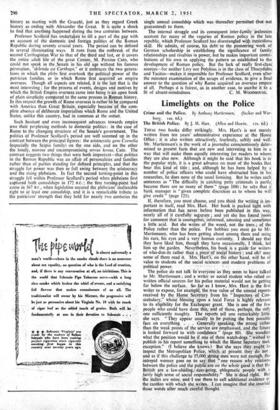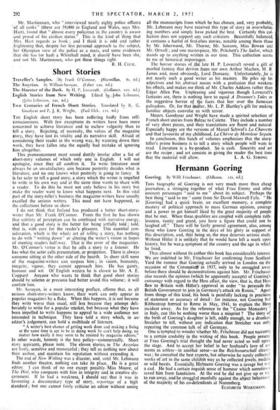Limelights on the Poliee The British Police. By J. M.
Hart. (Allen and Unwin. 1 25. 6d.) THESE twp books differ strikingly. Mrs. Hart's is not merely written from ten years' administrative experience at the Home Office ; it is also written attractively, fearlessly, saltily and well. Mr. Martienssen's is the work of a journalist conscientiously deter- mined to present facts that are new and interesting to him in a way that will make them equally interesting for readers to whom; they are also new. Although it might be said that his book is in the popular style, it is a great advance on most of the books that bear this kind of title ; and, although be has been helped by a. number of police' officers who could have obstructed him in his researches, he does none of the usual lionising. But he writes such sentences as "The difficUlty in catching petty criminals is partlyt because there are so many of them " (page 108) ; he says that a bank manager is " given complete discretion as to whom he will give credit " (page 121).
If, therefore, you must choose, and you think the writing is im- portant in itself, read Mrs. Hart. Her book is packed tight with information that his never before been published in this way, nearly all of it carefully accurate ; and yet she has found room for comment that is courageous: informed, amusing and sometimes a little acid. But she writes of the wood, not the trees ;. of the Police rather than the police. For bobbies you must go to Mr. Martienssen, who has been getting about among them and using his ears, his eyes and a very human curiosity. I should say that they have liked him, though they have occasionally, I -think, led him up the garden. Nevertheless, his book is a guide for writers of who-dun-its rather than a piece of social history ; and oh! may some of them read it. Mrs: Hart's, on the other hand, will be of value to students of the social sciences and modern problems of political power.
The police do not talk fO-everyone as they seem to have talked to Mr. Martienssen ; and a writer or social student who relied on written official sources for his police material would not be getting far below the surface. So far as I know, Mrs. Hart is the first writer to expose, for example, the true value of the annual reports received by the Home Secretary from his " Inspectors of Con- stabulary," whose blessing upon a local Force is highly relevant to its eligibility for the Exchequer grant. She is one of the few people who could have done this, and of those, perhaps, the only • one sufficiently naughty. The reports tell one remarkably-little, she says. "They appear usually to be putting the best possible face on everything. . . . Generally speaking, the- strong rather than the weak points of the service are emphasised, and the future is looked forward to with- confidence " (page 80). She wonders what the position would be if one of these watch-dogs ".wished to publish in his report something to which the Home Secretary took exception." (I believe she knows.) But she says they ought to inspect the Metropolitan Police, which at present they do not ; and as if this challenge to' M000 stiong men were not enough, the intrepid woman goes on to say that " one reason why relation, between the police and the public are on the whole good is that the British are a- law-abiding, easy-going, phlegmatic people with. a fairly high sense of social responsibility." She is-dead right. But the italics are mine, and -I use them to call additional evidence, of the caution with which she writes. I can imagine that she inserted those words after much careful thought. Mr. Martienssen, who " interviewed nearly eighty police officers of all ranks " (there are 59,000 in England and Wales, says Mrs. Bart), found that " almost every policman in the country is aware :and proud of his civilian status." This is the kind of thing that Mrs. Hart regards as bunk ; and I think it is odd and rather frightening that, despite her less personal approach to the subject, her Olympian view of the police as a mass, and some evidences that she has (or had) a Whitehall mind, it should have been she, and not Mr. Martienssen, who got these things right.
R. H. CECIL.



































 Previous page
Previous page